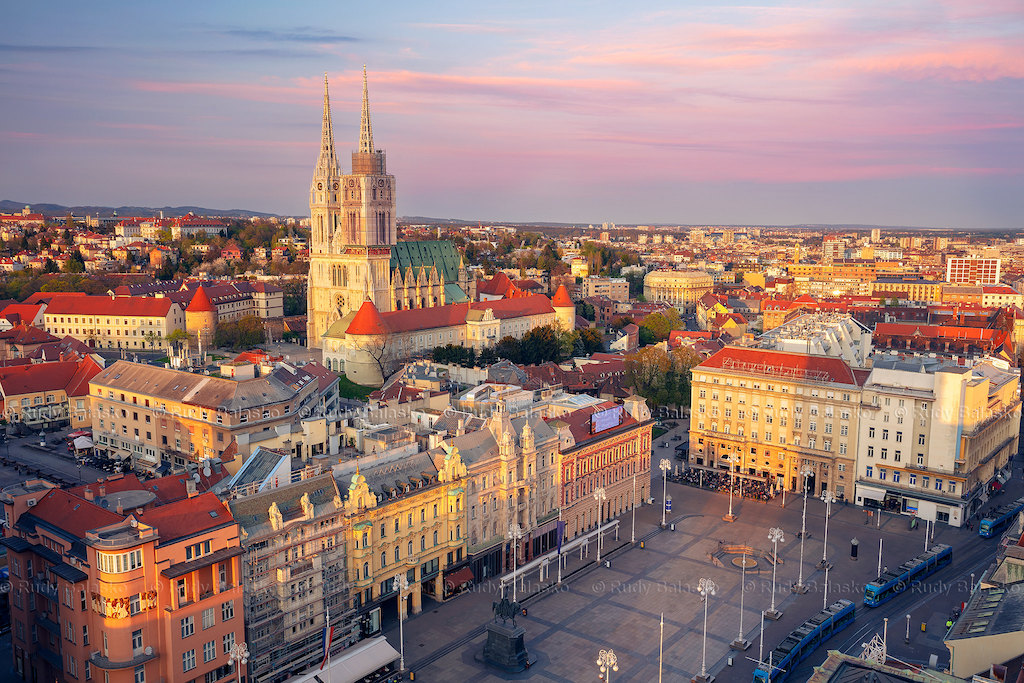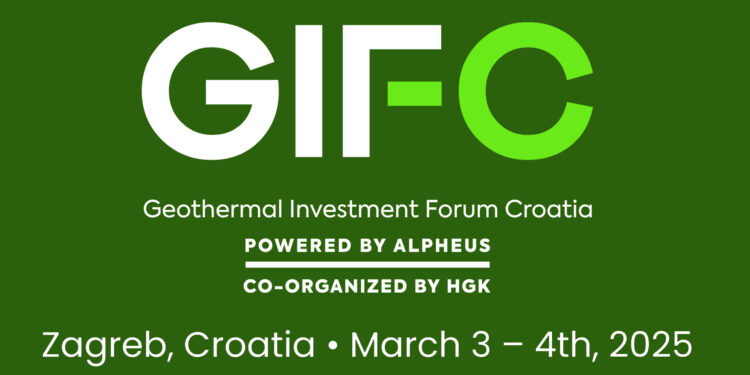Geothermal Investment Forum Croatia, the first major geothermal event to be hosted in Croatia, will be taking place on 3-4 March 2025 in Zagreb.
In early March, Zagreb will host the first-ever Geothermal Investment Forum Croatia 2025 (GIFC2025), the first international conference in Croatia dedicated exclusively to geothermal energy.
The conference will take place on 3-4 March 2025, at the Sheraton Zagreb Hotel, bringing together leading experts, government officials, industry representatives, financial institutions, and academia from Croatia, Europe, and around the world.
Registration for GIFC 2025 is now open. Click here to register.
Amidst ongoing geopolitical uncertainties, strengthening Europe’s energy, sovereignty and sustainability has become a key priority. Geothermal energy is a renewable, stable, and carbon-neutral energy source, with estimates suggesting it could meet up to a quarter of Europe’s heating and cooling needs and up to 10% of its electricity demand. Recognized as a key driver in achieving climate neutrality by 2050 under the European Green Deal, geothermal energy is gaining increasing prominence.
The European Parliament’s 2023 EU Policy Document on Geothermal Energy acknowledges its critical role in decarbonizing the heating and cooling sector. Additionally, in late 2023, a Report on Geothermal Energy was adopted to shape future legislative initiatives of the European Commission and provide member states with a policy framework for geothermal energy development. The urgency of geothermal energy development was reaffirmed in December 2024 by the Council of Ministers, which called on the European Commission to draft a comprehensive strategy for heating and cooling decarbonization, supported by the EU geothermal action plan, to facilitate project implementation and accelerate geothermal energy deployment.
The high geothermal potential of Croatia
Croatia boasts the highest geothermal potential in Europe, exceeding the European average by 60%, presenting both a challenge and a responsibility to harness this resource for clean and stable energy for its citizens. According to Croatia’s National Energy and Climate Plan, the anticipated electricity output from geothermal sources by 2030 is expected to reach 68 MW—equivalent to one-fifth of the capacity of the Croatian share in the Krško Nuclear Power Plant’s (348 MW), which currently meets 16% of Croatia’s annual electricity demand.
However, with further investments, projections for 2050 are estimated at 405 MW, surpassing Croatia’s share of Krško, meaning that over 30% of the country’s electricity could come solely from geothermal and nuclear sources—not even accounting for additional contributions from solar, wind, and hydropower, which are also carbon-neutral.
“Croatia holds a unique position in Europe. Our high geothermal gradient, combined with strategic investments, can position us as a geothermal leader at the European level, while providing our citizens with clean and stable energy. Geothermal energy is becoming an increasingly vital part of the energy mix—Europe has recognized this, while Croatia, as a country with one of the greatest potentials, must act swiftly”, says Dragutin Domitrovic, Chairman of the GIFC 2025 Program Committee.
He further emphasized that the development of geothermal projects requires significant financial investments, which is why the conference will host representatives from the European Bank for Reconstruction and Development (EBRD), the World Bank, and the European Investment Bank (EIB).
 View over Zagreb, Croatia (source: flickr/ Rudy Balasko, creative commons)
View over Zagreb, Croatia (source: flickr/ Rudy Balasko, creative commons)
The time for Croatia to position itself strategically
Panels and discussions at the conference will cover various topics, including geothermal energy in urban development in the context of enhancing energy efficiency, with concrete examples of cities that have implemented geothermal heating and cooling systems. The focus will also be on the investment models and risk mitigation, concentrating on successful investment case studies and the use of geothermal energy in agriculture. The panelists will include representatives from leading energy companies such as ENNA, SOYAK, and SLB, as well as Members of the European Parliament, led by Croatian MEP Davor Ivo Stier.
“We are not reinventing the wheel—we are literally sitting on it – Croatia one of Europe’s leading geothermal potentials, yet awareness remains low, despite a clear need at both the European and national level. This forum is the first to actively promote Croatia’s geothermal potential. Now is the time for Croatia to strategically position itself and attract investment for the green energy transition,” explained Mario Aunedi Medek, Managing Director of Alpheus Public Affairs, the agency organizing the conference, in partnership with the Croatian Chamber of Economy (HGK).
The GIFC 2025 expert program committee includes representatives from: Hrvoje Požar (Energy Institute), Croatian Chamber of Economy (CCE), European Geothermal Energy Council (EGEC), Croatian Geothermal Energy Association, Faculty of Mining, Geology, and Petroleum Engineering, led by Dragutin Domitrovic, energy expert and Director of IGeoPen.
“This conference is a clear signal that Croatia is being recognized as a key hub for geothermal energy development in Europe. Geothermal energy is a driver of economic growth and a resource that can provide stable and predictable energy today. In order to reach its full potential, it must be consistently integrated into strategic plans and implementation policies. Clear and supportive conditions for all renewable energy sources are essential, and in the case of geothermal energy, this is particularly crucial due to the complexity of such projects,” argues Marija Šculac, Director of the Sector for Industry and Sustainable Development at the Croatian Chamber of Economy.
GIFC 2025 is the project developed by Alpheus Public Affairs, co-organized by the Croatian Chamber of Economy (HGK) and in partnership with the European Geothermal Energy Council (EGEC). The conference is held under the high patronage of the Ministry of Economy of the Republic of Croatia and the European Parliament (EP). Institutional support is provided by the Croatian Hydrocarbon Agency (CHA), which has developed a unique, interactive, and publicly accessible platform mapping all geothermal exploration and exploitation sites in Croatia.
The CHA has also secured €30 million in grants from the National Recovery and Resilience Plan (NRRP) for geothermal exploration near six Croatian cities: Vinkovci, Vukovar, Osijek, Sisak, Zaprešic, and Velika Gorica. If these prove to be successful, they could provide geothermal heating sources for households, public institutions, and businesses in these cities.
Source: Email correspondence

Source link : http://www.bing.com/news/apiclick.aspx?ref=FexRss&aid=&tid=67b8cddba35240c59dd98ee479f4ba22&url=https%3A%2F%2Fwww.thinkgeoenergy.com%2Fcroatia-to-host-its-first-major-geothermal-energy-conference-on-march-2025%2F&c=16138752911034458891&mkt=de-de
Author :
Publish date : 2025-02-21 09:48:00
Copyright for syndicated content belongs to the linked Source.


